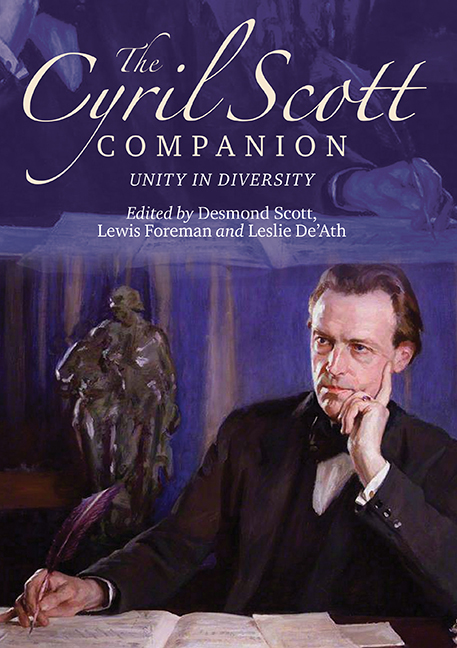Book contents
- Frontmatter
- Dedication
- Contents
- List of Illustrations
- List of Tables
- List of Contributors
- Foreword
- Preface
- Acknowledgements
- Editors' Note
- I SCOTT IN CONTEXT
- II THE MUSIC
- III THE WRITINGS
- 17 The Poetry
- 18 The Occult Writings
- 19 The Purpose of The Boy Who Saw True
- 20 Near the End of Life: Candid Confessions and Reflections: A Discussion of the Memoir
- 21 The Therapeutic Books
- 22 Childishness or The Moron Mind
- 23 A Note on the Plays
- IV PERSONAL REMINISCENCES
- APPENDICES
- CATALOGUES, DISCOGRAPHY AND BIBLIOGRAPHY
- Index of Works
- General Index
21 - The Therapeutic Books
from III - THE WRITINGS
Published online by Cambridge University Press: 14 September 2019
- Frontmatter
- Dedication
- Contents
- List of Illustrations
- List of Tables
- List of Contributors
- Foreword
- Preface
- Acknowledgements
- Editors' Note
- I SCOTT IN CONTEXT
- II THE MUSIC
- III THE WRITINGS
- 17 The Poetry
- 18 The Occult Writings
- 19 The Purpose of The Boy Who Saw True
- 20 Near the End of Life: Candid Confessions and Reflections: A Discussion of the Memoir
- 21 The Therapeutic Books
- 22 Childishness or The Moron Mind
- 23 A Note on the Plays
- IV PERSONAL REMINISCENCES
- APPENDICES
- CATALOGUES, DISCOGRAPHY AND BIBLIOGRAPHY
- Index of Works
- General Index
Summary
The cause of disease is a simple one, so is the method for its prevention and cure.
Unless things of the spirit are taken into consideration as well, medical science can never be complete and the doctor will search in vain for truth.
THOSE two quotes from Doctors, Disease and Health sum up almost everything Cyril Scott had to say in all the books he wrote on the subject. He not only provided advice on medical matters, but also offered a spiritual answer to the troubling question of why one person could be healed and another not. One may think it unusual to find philosophy and therapeutics together in the same volume, but Scott was a most unusual man, whose philosophy embraced both the physical and the spiritual and whose motto was Unity in Diversity.
Over a period of thirty years, beginning in 1939 and ending in 1968, he published a total of ten books and pamphlets: four books on doctors and medicine, a book and a pamphlet on cancer, and four pamphlets on a variety of other health topics. The first book, Doctors, Disease and Health, was by far the most comprehensive, and Scott thought it the best book he wrote. The other volumes are mainly shorter and revised versions of this first publication or, in the case of the booklets on black molasses, cider vinegar and constipation, variations of passages within it.
The book includes chapters on the cause of disease, on diet and nutrition, on vaccination and inoculation, on constipation, on commercialism and on alternative systems of medicine, and also has one chapter on astrology and another on reincarnation, because the human body, in Scott's view, was an instrument of the soul, ‘to be made as efficient as possible for preliminary steps towards mental and spiritual evolution’.
What caused him to turn to writing therapeutic books Scott explained in his Simpler and Safer Remedies for Grievous Ills:
As a child, despite the fact that I was blest with the most considerate and understanding parents, my health was very poor indeed. Although my mother had no faith in ordinary doctors, she nonetheless waived her prejudices, and physician after physician was called in to prescribe for me, but without any noticeable results. Only when I grew older did my condition somewhat improve.
- Type
- Chapter
- Information
- The Cyril Scott CompanionUnity in Diversity, pp. 359 - 370Publisher: Boydell & BrewerPrint publication year: 2018



